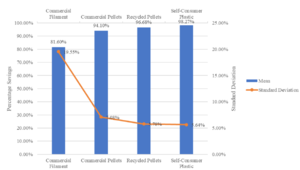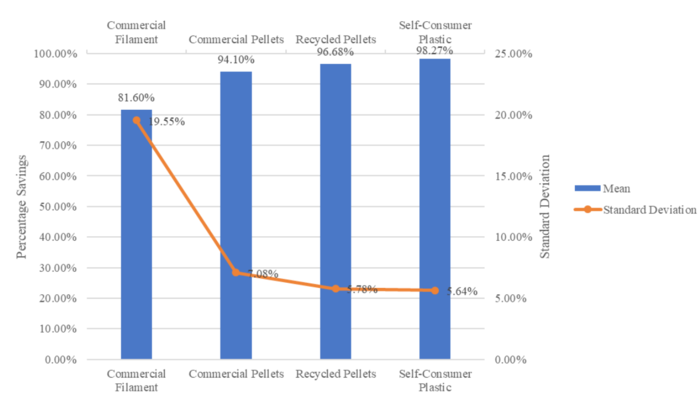
Several studies have indicated potential of producing consumers digitally reproducing open source designs with 3-D printers to offset purchasing commercial products. With over 2 million desktop 3-D printers being purchased per year, the impact on the existing industry could be substantial, but is still unknown. To begin to determine the economic impact created by proliferation of open source digital designs for 3-D printed products, this study analyzes the top 100 most popular designs posted on the YouMagine repository. The download substitution value is calculated based on Amazon prices of comparable products to estimate the potential savings those designs could generate. Case studies are provided on open source equivalent products, non-commercial products of high value to the consumer, and products for 3-D printing users. The means of percentage savings using commercial filament, commercial pellets, recycled commercial pellets, and self-recycled consumer plastics are 82%, 94%, 97% and 98%, respectively. The potential for laterally-scaled wealth generation in a circular economy with recyclebots, 3-D printing and sharing open designs in the US from household plastic waste is over $359 billion/year for offset filament purchases or over $7 trillion/year for products. If adoption of household-level DIY digital manufacturing of open source designs becomes widespread open business models are needed.
See also[edit | edit source]
- Emergence of Home Manufacturing in the Developed World: Return on Investment for Open-Source 3-D Printers
- Life-cycle economic analysis of distributed manufacturing with open-source 3-D printers
- Distributed Manufacturing of Flexible Products- Technical Feasibility and Economic Viability
- Impact of DIY Home Manufacturing with 3D Printing on the Toy and Game Market
- Quantifying the Value of Open Source Hardware Development
- Open-source, self-replicating 3-D printer factory for small-business manufacturing
- Distributed manufacturing with 3-D printing: a case study of recreational vehicle solar photovoltaic mounting systems
- Global value chains from a 3D printing perspective
- Economic Potential for Distributed Manufacturing of Adaptive Aids for Arthritis Patients in the U.S.
- Low-cost open source ultrasound-sensing based navigational support for visually impaired
- Towards national policy for open source hardware research: The case of Finland
- Parametric Nasopharyngeal Swab for Sampling COVID-19 and Other Respiratory Viruses: Open Source Design, SLA 3-D Printing and UV Curing System
- Open-Source Medical Hardware for Pandemics
- Economic Savings for Scientific Free and Open Source Technology: A Review
- Emerging Business Models for Open Source Hardware
- Economic Savings for Scientific Free and Open Source Technology: A Review
- Quantifying the Value of Open Source Hardware Development
- Strategic Investment in Open Hardware for National Security
- Towards national policy for open source hardware research: The case of Finland
- Professors Want to Share: Preliminary Survey Results on Establishing Open Source Endowed Professorships
- Canadian professors’ views on establishing open source endowed professorships
- Open source decarbonization for a sustainable world
- Equitable Research Capacity Towards the Sustainable Development Goals: The Case for Open Science Hardware
- Business Models for Open Source Hardware Repositories
- Leveraging Open Source Development Value to Increase Freedom of Movement of Highly Qualified Personnel





